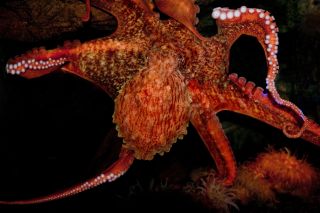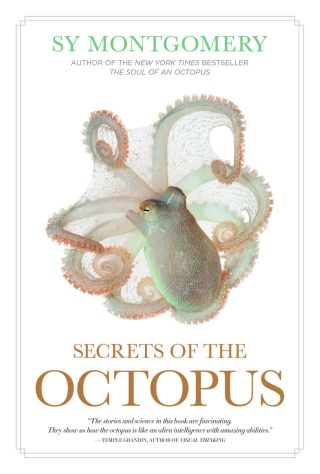Animal Behavior
The Fascinating Secret Social Lives of Octopuses
Author Sy Montgomery explains what it is like to be an octopus.
Updated March 15, 2024 Reviewed by Davia Sills
Key points
- Based on the latest scientific research and wonderful stories, 'Secrets of the Octopus' is a must-read.
- One of the most astonishing fields of inquiry centers on octopuses' social lives; they're not loners.
- Almost everything we once thought we knew about octopuses is wrong.

Octopuses are amazing animals. They're extremely intelligent and highly emotional, sentient, large-brained beings whose behavior continues to fascinate people around the world. Award-winning author Sy Montgomery—often called the "octopus whisperer" based on her outstanding book The Soul of an Octopus—along with Warren K. Carlyle IV, have produced a new book titled Secrets of the Octopus that will endlessly fascinate readers. Did you know that the large brain of these amazing animals occupies their whole body—not just their heads? And they can adjust their genetic makeup to respond to the demands of the environment? And octopus mothers are deeply dedicated to their children even though they usually die shortly after their offspring hatch?
I'm thrilled that Sy could answer a few questions about her landmark book based on the latest science and wonderful stories. Here's what she had to say about what it is like to be an octopus.

Why did you write Secrets of the Octopus?
My first book about octopuses, The Soul of an Octopus, caught everyone, including me, by surprise. The book became an unexpected bestseller and was an even more unexpected finalist for the National Book Award. The book even inspired the creation of OctoNation, the world's largest octopus fan club! And then, suddenly, octopuses were everywhere: on mugs and tee-shirts, tattooed on people's skin, headlining in magazines and newspapers and research journals.
Craig Foster's film My Octopus Teacher won an Oscar. Remarkably Bright Creatures, a novel starring an octopus protagonist, became an overnight hit. And while I had earlier always kept an eye out for news about octopuses, now it seemed there was a virtual explosion of new scientific discoveries about these intelligent, sensitive marine invertebrates—and the research was attracting attention (and presumably funding) like never before.
So when National Geographic contacted me about writing a book to pair with the new film series the iconic society was creating for television, I accepted with delight. This allowed me to take a deep dive into octopus research, much of which was entirely new and almost unimaginably exciting since I had first begun working on The Soul of an Octopus in 2011.
How does your book relate to your backgrounds and general areas of interest?
All my books are about animals, and all of them—from the picture books for little people too young to read to the ones that also delve into philosophy and science—reveal the same truth: Our world is full of wonders that should split our hearts open with awe. The new research highlighted in this book shows that octopuses are even more dazzling than we previously understood—gifted with otherworldly powers, from their senses to their intellect to, in some cases, their unexpectedly complex social lives.
Who do you hope to reach in your interesting and important book?
Nature lovers, science lovers, and folks intrigued by sea life.
What are some of the major topics you consider?
The book, like the TV series, is divided into three parts, reflecting new discoveries about octopus camouflage, intelligence, and (surprisingly!) sociality. The octopus's ability to change color and shape has always seemed magical, but today, scientists are documenting how these animals do far more than match their background; several species masquerade as animals as utterly different from themselves as snakes and flatfish. Others mimic the weather! These powers are under the octopus' conscious control and demand a level of intelligence wholly unexpected in a creature closely related to clams and snails.
Octopuses use tools. They will lug two coconut halves, for instance, long distances for later assembly as a safe Quonset hut. They may seize shells as shields to protect themselves against attackers.
And for me, one of the most astonishing fields of inquiry looks into octopuses' social lives. When I began researching my earlier book, it was thought that almost all octopus species were loners, coming together only for copulation or cannibalism (and sometimes both: Occasionally, a romantic encounter turns out to be a literal dinner date, when the female eats the male). Not so! Several species of octopus previously believed to be solitary—including the giant Pacific octopus, the species most often displayed in public aquaria—have now been documented living in aggregations so tightly packed they resemble octo condos. An Australian species known as the gloomy octopus (not because they are sad; they just have big, expressive eyes) has been documented living in dens so closely packed together that two study sites are known as "Octopolis" and "Octlantis."
Octopuses also work together with fishy associates, cooperatively hunting prey, like a person with a German short-hair pointer. A fish will come and signal to the octopus that it's found a good spot where they can both find good prey. The fish may point out the spot, and the octopus will pour its bendy, almost liquid arms into a crevice that the fish could never reach. Both species benefit.
In fact, the one thing that can be said about our new understanding of octopuses is that almost everything we once thought we knew about octopuses is wrong!
How does your book differ from others that are concerned with some of the same general topics?
There are some excellent books out on the octopus right now, such as my friend David Scheel's Many Things Under a Rock and Other Minds by another friend of mine, the philosopher Peter Godfrey-Smith. These books rightly highlight the work of their authors—as my Soul of an Octopus mainly focused on my own personal experience with individual animals. Secrets of the Octopus, however, showcases brand-new, groundbreaking research by a variety of researchers around the world. And it's paired with octo-profiles of some of the mind-blowing species, written by OctoNation founder Warren Carlyle, and with astonishing images for which National Geographic is justly world-renowned.
Are you hopeful that as people learn more about these amazing beings, they will be more open to developing and maintaining a relationship of coexistence that is a win-win for everyone?
Absolutely! And that's especially important right now, as our oceans are increasingly endangered by global warming, pollution, ship traffic, over-fishing, and noise—not to mention the cruel and environmentally dangerous plans to factory farm octopuses in the Canary Islands. With everything I write, I aim to help readers join me in falling in love anew with this life and with the creatures in it. For once we do, we deepen our commitment to treat all our neighbors—human and non, vertebrate and invertebrate—with renewed respect and compassion. Who better than octopuses to show us the way?
References
In conversation with award-winning author Sy Montgomery, called “Equal parts poet and scientist” by The New York Times and “Part Indiana Jones and part Emily Dickinson" by The Boston Globe. Sy has been chased by an angry silverback gorilla in Rwanda, hunted by a tiger in India, and swam with piranhas, electric eels and pink dolphins in the Amazon, and her work has taken her from the cloud forest of Papua New Guinea (for a book on tree kangaroos) to the Altai Mountains of the Gobi (for another on snow leopards). Octopus expert Warren K. Carlyle IV, is the founder and CEO of OctoNation®, the world's largest octopus fan club, a nonprofit organization with over a million followers. Dubbed the OctoKing by Sy Montgomery, OctoNation has evolved into a world-class community, regularly collaborating with a global network of underwater photographers, marine biologists, research institutions, artists, celebrities, aquarists, and octopus fans. These connections have led to groundbreaking discoveries and engaging educational content that captivates audiences worldwide.
Octopuses: The Fascinating Lives of Sensitive, Clever Beings; What Is It Like to Be an Octophant?




